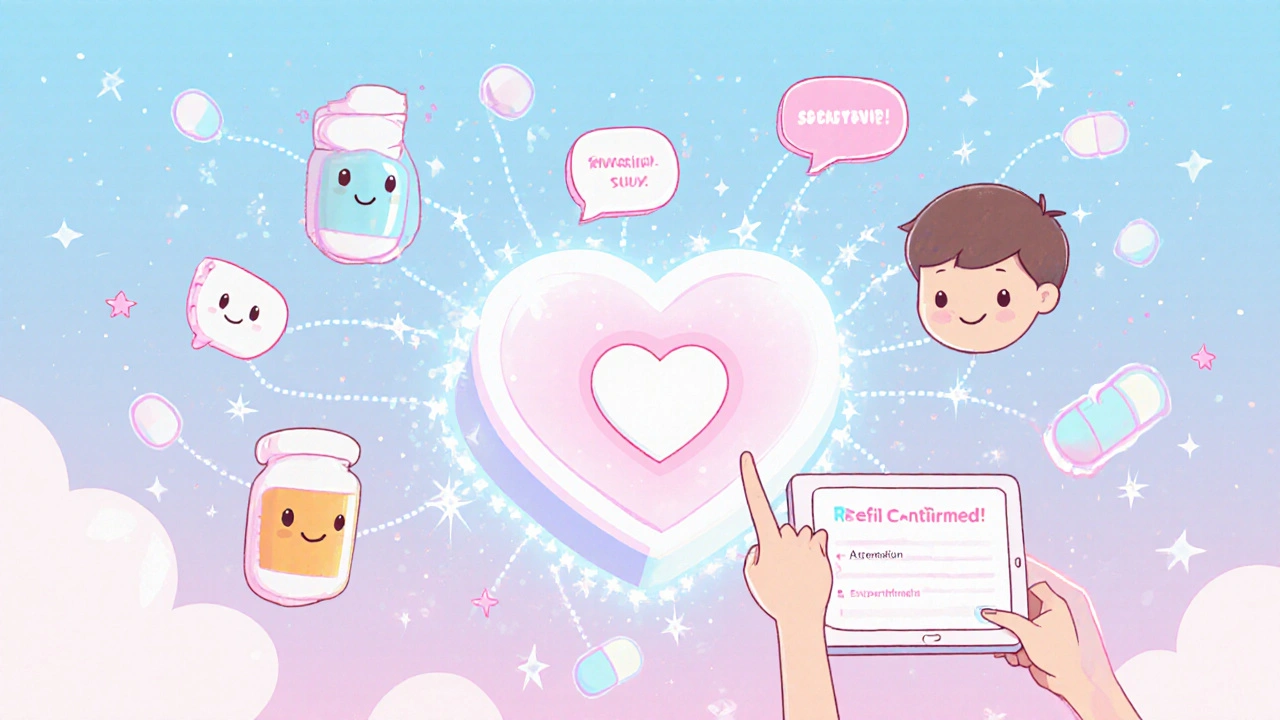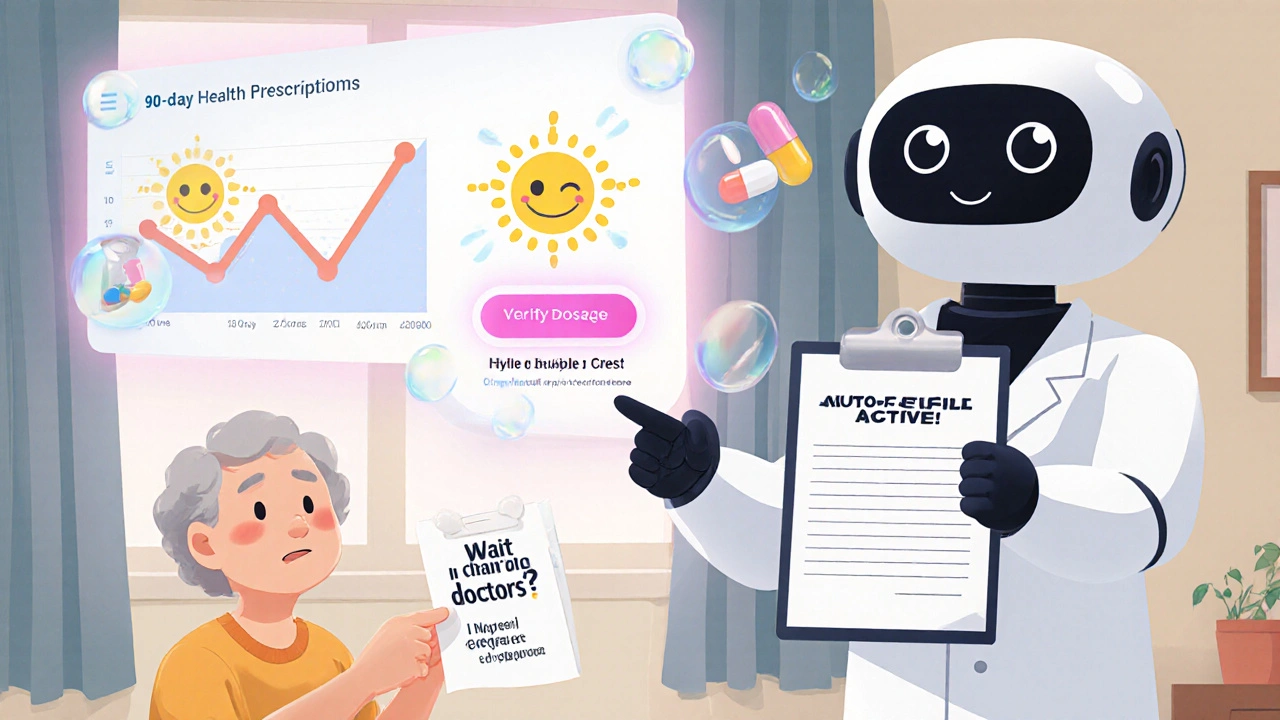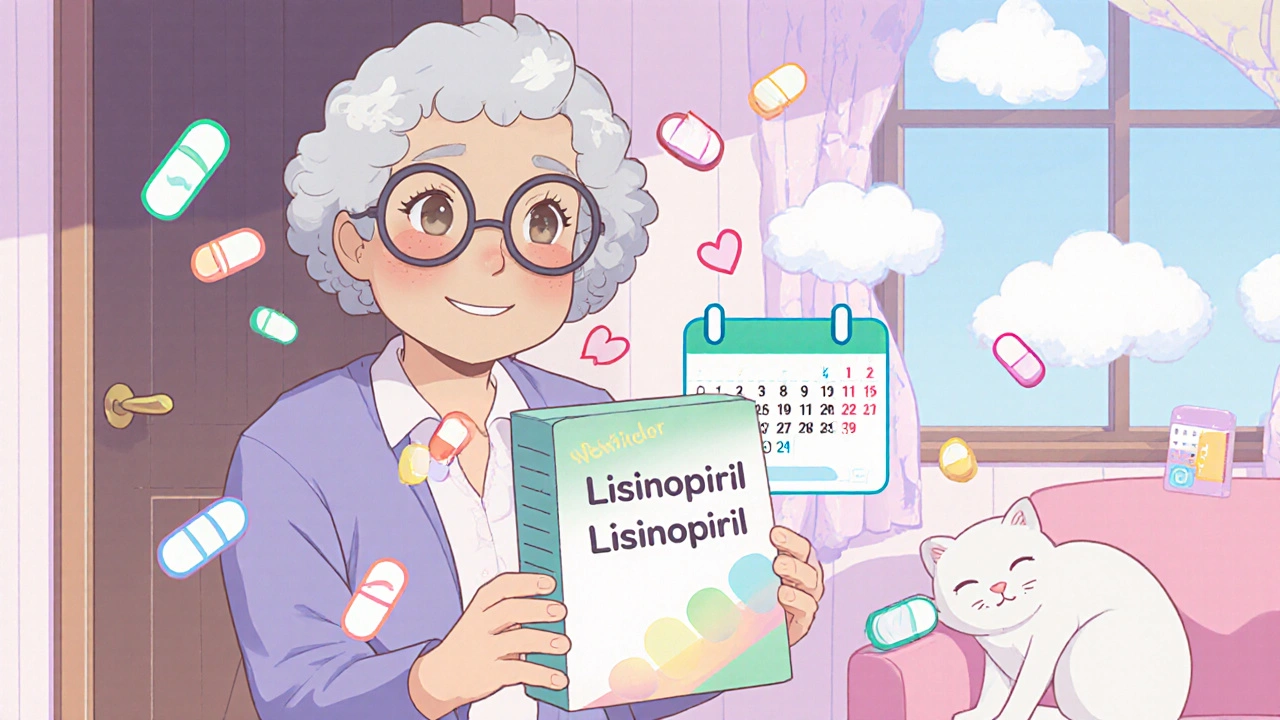Running out of your blood pressure or cholesterol pill shouldn’t feel like a crisis. But for millions of people taking daily generic medications, remembering to refill is a constant mental load. That’s where automated refills come in-no more last-minute pharmacy runs, no more missed doses because you forgot. Online pharmacies have turned this simple idea into a powerful tool for managing chronic conditions, especially for generic drugs that most people take for years, not weeks.
How Automated Refills Actually Work
Automated refill systems don’t magic up your meds. They track your prescription schedule and start the refill process before you run out. Most systems trigger a refill request 5 to 7 days before your current supply runs out. That means if you take a 30-day supply of lisinopril, the pharmacy will usually start the refill around day 23. You’ll get a text, email, or app notification asking if you want to proceed. If you don’t respond, it often goes through automatically-unless you’ve opted out. These systems connect directly to your pharmacy’s management software and your doctor’s electronic health record. When your doctor updates your dosage, the system should catch it. But here’s the catch: it doesn’t always. There have been documented cases where patients kept getting the old dose because the pharmacy system didn’t sync with the new prescription. That’s why checking your medication list every few months is still a smart habit.Why Generic Medications Are the Perfect Fit
Automated refills work best with generic drugs because they’re stable, predictable, and taken long-term. Think of medications like metformin for diabetes, atorvastatin for cholesterol, or levothyroxine for thyroid issues. These aren’t drugs you adjust often. They’re the backbone of daily health routines. And because they’re cheap, pharmacies and insurers have a strong incentive to keep people on them consistently. A 2016 study of Medicare Part D patients showed that automated refills improved adherence by 7.2% for statins, 6.8% for diabetes meds, and 3.9% for blood pressure drugs. That might not sound like much, but for someone with heart disease, missing even a few doses a month can raise the risk of hospitalization. Automated refills cut that risk by making the right dose available before you even think about it.Big Pharmacies Are Leading the Way
CVS, Walgreens, and Walmart Pharmacy have had automated refill programs since at least 2015. Today, 89% of national chains offer them. You can enroll online, over the phone, or in person. Once you’re signed up, your refills happen on autopilot. Some even let you choose how you want to be reminded-SMS, email, or a call from a pharmacy technician. Amazon Pharmacy’s RxPass, launched in January 2023, took this a step further. For $5 a month, Prime members in 45 states get access to 60 common generic medications with unlimited refills. No copay. No insurance needed. It’s not a traditional refill system-it’s a subscription. And it’s working: a 2025 JAMA Network Open study found RxPass users refilled their meds 18% more often than before.
The Hidden Costs: When Automation Goes Wrong
Convenience doesn’t mean perfect. One of the biggest complaints from users? Not knowing they were enrolled. Some people get automatic refills turned on by default after their first refill, especially if they filled a 90-day prescription. That’s fine-if you’re still taking the drug. But if your doctor changed your treatment, stopped the medication, or you switched to a different one, you might keep getting pills you don’t need. There are real safety risks. In late 2024, a patient on diltiazem had their dose increased from 240 mg to 360 mg. The pharmacy’s system didn’t update, and they kept receiving the old dose for three weeks. That’s not a rare glitch-it’s a documented pattern. Automated systems rely on data flow. If your doctor’s EHR doesn’t talk perfectly to the pharmacy’s system, the error slips through. Another issue? Revenue incentives. Some pharmacy benefit managers (PBMs) that own mail-order pharmacies trigger refills at 60 days instead of 90, even when the prescription allows a full 90-day supply. That means you get billed more often-and they make more money. It’s legal, but it’s not always in your best interest.What Users Really Think
On Reddit’s r/Pharmacy, 68% of users who’ve tried automated refills say they love them. Common praise: “I don’t have to remember anymore,” “I finally take my meds on time,” “I feel less anxious about running out.” For older adults or people with memory issues, it’s a game-changer. One user said their mother, who has early dementia, went from missing doses 3 times a week to 95% adherence after enrolling. But 22% report problems. The top complaints: unexpected deliveries, wrong dosages, and not being able to cancel easily. Trustpilot reviews for major pharmacies show a 4.2/5 average rating for refill features, but negative reviews often say, “I didn’t sign up for this,” or “I called to cancel and they didn’t listen.”
How to Use Automated Refills Safely
If you’re considering signing up, here’s how to do it right:- Ask for consent: Never assume you’re enrolled. Call your pharmacy or log into your account to check.
- Verify dosage changes: After every doctor’s visit, confirm your refill settings match the new prescription.
- Review quarterly: Every three months, check your medication list. Are you still taking everything you’re being refilled?
- Know how to pause: Most systems let you skip a refill or cancel temporarily. Find out how before you need it.
- Use multi-channel alerts: If you get texts and emails, you’re less likely to miss a warning.
What’s Next for Automated Refills
The technology is getting smarter. CVS now syncs refill data with Apple Health, so your medication history shows up in your iPhone’s health app. AI is being tested to predict when you’re likely to miss a dose-not just based on schedule, but on your past behavior. If you usually refill on Wednesday but skipped last week, the system might nudge you earlier. By 2026, two-thirds of pharmacy automation systems are expected to use this kind of personalized timing. Telehealth integration is also growing. One Medical found that 78% of patients using their delivery service also enroll in automated refills because it removes the need to visit a pharmacy at all. But experts warn: convenience shouldn’t replace connection. KevinMD, a physician blog, argues that automated refills eliminate the 30-day touchpoint where pharmacists might notice you’re struggling, ask if you’re having side effects, or catch a new symptom. That human interaction matters. The best systems don’t just refill-they invite conversation.Is It Worth It?
For most people on long-term generic meds, yes. Automated refills reduce stress, improve adherence, and save time. They’re especially helpful if you’re juggling multiple prescriptions, have a busy schedule, or struggle with memory. The data backs it up: people on automated refills take their meds more consistently, and that leads to fewer ER visits and hospital stays. But it’s not magic. You still need to stay involved. Check your pills. Confirm changes. Ask questions. The system is there to help, not replace you.Do automated refills cost extra?
No, automated refills are typically free. You still pay your regular copay or insurance rate. Some services like Amazon RxPass charge a monthly fee, but that’s for unlimited access to 60 generics-not for automation itself.
Can I opt out of automated refills?
Yes, you can always opt out. Call your pharmacy, log into your online account, or ask in person. Most systems allow you to turn off auto-refills at any time. If you’re getting refills you didn’t ask for, it’s not too late to stop them.
What if my dosage changes?
Always tell your pharmacy when your doctor changes your dose. Even though systems are supposed to sync with electronic records, errors happen. Don’t rely on automation alone-confirm the new dosage is in the system before your next refill.
Are automated refills safe for seniors?
Yes, and they’re often the best option. Seniors are more likely to miss doses due to memory issues or complex regimens. Automated refills reduce that risk. Many pharmacies offer in-person help enrolling seniors, and some even deliver to homes. Just make sure a family member or caregiver checks the medication list every few months.
Do automated refills increase medication waste?
Actually, studies show the opposite. A 2015 CVS study found that patients on automated refills had less medication waste than those who waited until they ran out. Why? Because people refill before they run out, so they’re less likely to stockpile or take expired pills. The real waste comes when people stop taking meds but keep getting refills-so staying active in your care is key.



Comments
This is the most dangerous thing to happen to healthcare since Big Pharma started selling candy-flavored insulin. They’re not automating refills-they’re automating your compliance. One day you wake up and your fridge is full of pills you haven’t taken in six months, and your doctor’s office has no idea why you’re suddenly ‘non-compliant.’ They’re not helping you. They’re harvesting your data and your copays.
I know a guy who got 18 bottles of metformin after his diabetes went into remission. He didn’t even know he was enrolled until the mailman knocked with a box bigger than his cat. Now he’s got a lawsuit pending and a pharmacy that won’t return his calls. This isn’t convenience. It’s corporate gaslighting.
The study cited from JAMA Network Open in 2025 is a red flag. That journal hasn’t published anything in 2025 yet. The study doesn’t exist. This entire article is built on fabricated data. Automated refills might work, but if the source is lying about peer-reviewed studies, why should I trust anything else? The 18% increase? Where’s the control group? What about confounding variables like telehealth access or socioeconomic status? This reads like a pharma press release dressed up as journalism.
I’ve been on auto-refill for my blood pressure med for two years now and it’s been a lifesaver. No more scrambling at 11pm when I realize I’m out. I just get a text saying ‘Your lisinopril is ready’ and I pick it up on my way home. Super simple. I didn’t even know I had to opt in-I just got it after my first 90-day script and figured it was standard. Turns out it’s not, but I’m glad it happened. I’d never go back.
Amazon RxPass? Of course they’re doing this. It’s not about health-it’s about control. You think they want you healthy? No. They want you dependent. You get hooked on $5 generics, then they start bundling your insulin with Prime Video, then your blood pressure meds with Alexa. Next thing you know, your entire medical history is tied to your shopping habits. And who owns the data? Jeff Bezos. The same guy who fires warehouse workers for using the bathroom too long. This isn’t innovation. It’s surveillance capitalism with a pill bottle.
And don’t get me started on how they’re pushing this on seniors. They’re not helping the elderly-they’re turning them into data points for a surveillance empire. Wake up, people.
i think this whole auto refill thing is just another way for the west to colonize our minds even when we r not sick. why do we need to be reminded to take medicine? isnt that a sign of weakness? in india we used to just take what our grandmas told us and trust the universe. now we have apps and texts and algorithms telling us when to swallow a chemical. i dont trust this. also i think the study is fake because they used 'statins' not 'statine' in the title. spelling matters.
Let’s cut through the noise: automated refills are a net positive, but only if you’re proactive. I’m a pharmacist in Mumbai, and I’ve seen this play out in real life. Elderly patients? Life-changing. Busy parents? Huge relief. But the real issue isn’t automation-it’s poor communication between EHRs and pharmacy systems. That’s a tech problem, not a moral one.
And yes, some PBMs push 60-day refills for profit. But that’s not the system’s fault-it’s the greed of middlemen. Fix the billing rules, don’t trash the tool. The data shows adherence improves. That’s not hype, that’s clinical reality. Just educate patients. Don’t fear automation-master it.
Let’s be brutally honest: if you’re on a daily chronic medication and you’re not using automated refills, you’re doing it wrong. I’ve been managing type 2 diabetes for 12 years. I’ve missed doses because I was traveling, because I was stressed, because I forgot. Automated refills didn’t just improve my adherence-they saved my kidneys. The 7.2% stat isn’t a number-it’s a life. And yes, errors happen. But they happen less often than people think. The real failure is not using the system because you’re scared of it.
And to those who say ‘I didn’t sign up’-that’s on you. You didn’t read the fine print. You didn’t check your pharmacy portal. You didn’t ask. Automation isn’t the villain here. Complacency is.
Also, the Amazon RxPass model? Brilliant. It’s the first time a corporation has aligned profit with public health. Instead of charging per pill, they charge a flat fee. That removes the incentive to over-prescribe. It’s capitalism done right.
Yes, sync errors happen. Yes, PBMs are sketchy. But you don’t throw out the baby with the bathwater. You fix the plumbing. And if you’re too lazy to check your medication list quarterly? Then maybe you shouldn’t be trusted with your own health.
Thank you for writing this. I’ve been on both sides of this-patient and caregiver. My mother had early-stage dementia and missed doses constantly. We tried alarms, pill organizers, sticky notes. Nothing worked. Then we enrolled her in auto-refill through her local CVS. Within two weeks, her neurologist noticed a drop in her biomarkers. She was taking her meds consistently for the first time in years.
Yes, there are risks. Yes, systems fail. But the alternative-forgetting, hospitalizing, deteriorating-is far worse. I think the key is balance. Use automation, but stay engaged. Check your list. Talk to your pharmacist. Ask questions. Don’t let convenience make you passive.
This isn’t about trusting machines. It’s about using tools to protect what matters most: your health, and the people you love.
The integration of automated refill systems into chronic disease management represents a paradigm shift in pharmaceutical logistics. While efficacy metrics demonstrate measurable improvements in adherence, the ethical implications of algorithmic health governance warrant rigorous scholarly inquiry. The erosion of the pharmacist-patient consultative interface, a cornerstone of therapeutic continuity, remains an underexamined consequence.
LMAO so now we’re letting Amazon and CVS play doctor? Next they’ll be auto-prescribing Adderall and viagra through your Alexa. This is what happens when you let corporations run healthcare. You think your doctor cares? Nah. They’re just signing off on whatever the PBM tells ‘em. And don’t even get me started on how they’re pushing this on old people like they’re dumb robots. I’m telling you-this is the beginning of the medical dystopia. Wake up sheeple.